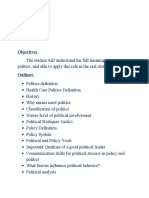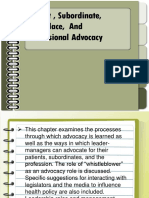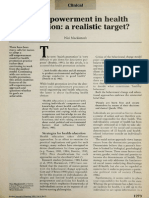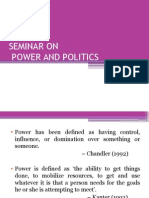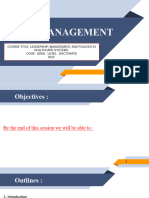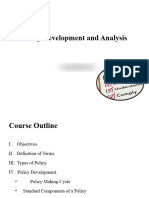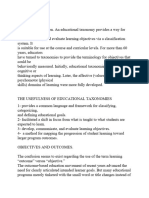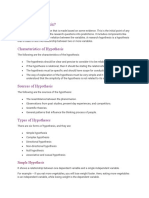0 ratings0% found this document useful (0 votes)
42 viewsHealth Care Politics in Nursing: Under Supervision of
Health Care Politics in Nursing: Under Supervision of
Uploaded by
فيصل الاعرجThis document outlines a seminar on health care politics in nursing. It discusses key topics like the definition of politics and how it relates to health care. It also covers why nurses need to be politically active, different levels of political involvement for nurses, and political strategies and tools. The objectives are for students to understand the role of nursing politics and how to apply it in real situations.
Copyright:
© All Rights Reserved
Available Formats
Download as DOCX, PDF, TXT or read online from Scribd
Health Care Politics in Nursing: Under Supervision of
Health Care Politics in Nursing: Under Supervision of
Uploaded by
فيصل الاعرج0 ratings0% found this document useful (0 votes)
42 views18 pagesThis document outlines a seminar on health care politics in nursing. It discusses key topics like the definition of politics and how it relates to health care. It also covers why nurses need to be politically active, different levels of political involvement for nurses, and political strategies and tools. The objectives are for students to understand the role of nursing politics and how to apply it in real situations.
Original Title
Untitled
Copyright
© © All Rights Reserved
Available Formats
DOCX, PDF, TXT or read online from Scribd
Share this document
Did you find this document useful?
Is this content inappropriate?
This document outlines a seminar on health care politics in nursing. It discusses key topics like the definition of politics and how it relates to health care. It also covers why nurses need to be politically active, different levels of political involvement for nurses, and political strategies and tools. The objectives are for students to understand the role of nursing politics and how to apply it in real situations.
Copyright:
© All Rights Reserved
Available Formats
Download as DOCX, PDF, TXT or read online from Scribd
Download as docx, pdf, or txt
0 ratings0% found this document useful (0 votes)
42 views18 pagesHealth Care Politics in Nursing: Under Supervision of
Health Care Politics in Nursing: Under Supervision of
Uploaded by
فيصل الاعرجThis document outlines a seminar on health care politics in nursing. It discusses key topics like the definition of politics and how it relates to health care. It also covers why nurses need to be politically active, different levels of political involvement for nurses, and political strategies and tools. The objectives are for students to understand the role of nursing politics and how to apply it in real situations.
Copyright:
© All Rights Reserved
Available Formats
Download as DOCX, PDF, TXT or read online from Scribd
Download as docx, pdf, or txt
You are on page 1of 18
Health Care Politics in Nursing
2022-2023
Under Supervision of:
Dr. Eglal Abdel-Wahab
Prof. of Nursing Administration
Prepared by
Manal Alharthi
Doctorate program
Seminars in specialized Nursing
1st semester
Faculty of Nursing
Cairo University
Objectives
The student will understand the full meaning of nursing
politics, and able to apply this role in the real situations.
Outlines
Politics definition
Health Care Politics Definition
History
Why nurses need politics
Classification of politics
Nurses level of political involvement
Political Strategies /tactics
Policy Definition
Policy System
Political and Policy Tools
Important Qualities of a good political leader
Communication skills for political success in policy and
politics
What factors influence political behavior?
Political analysis
Definition of politics
Politics is the negotiation for or influencing of, allocation
of scarce resources and resolution of conflict. Influence is the
act or power to produce an effect without the apparent use of
force or direct command. Policies are guidelines that tell us how
we obtain and allocate those resources.
Politics is the art of using legitimate power wisely. It
requires clear decision-making, assertiveness, accountability,
and the willingness to express one’s own views. It also requires
being proactive rather than reactive and demands decisiveness.
Politics are the activities associated with the governance of a
country or area, especially the debate between parties having
power.
Politics in health care
Is an interdisciplinary field of study concerned with the
analysis of social and political power over the health status of
individuals.
Historical perspective policy, politics, and nursing
The history of the modern nursing movement, which began
in 1873, tells the story of a pioneering group of women who
responded to the changing role of women in society. They
advocated a new profession for women and better health care
for the public. In forging the nursing profession in this
modern period, nurses had to enter the political arena to gain
legitimate authority over their education and practice.
The modern nursing movement began when Florence
Nightingale opened the nurse-training program at St. Thomas
Hospital in England in 1860. This landmark event signaled to
the world that nurses required schooling for the work they did
and provided one of the first opportunities for women to work
outside the home and be self-supportive.
In turn, the rise of modern nursing catalyzed the political
activism of nurses.
Professional nursing organizations began to form between
1893 and 1912. Their interests first revolved around the issues
confronting the profession but later expanded to include social
and political reforms affecting society:
• National League for Nursing in 1893
• American Nurses Association (ANA) in 1896
• National Association of Colored Graduate Nurses in
1908
• National Organization for Public Health Nursing in 1912
Why nurses need to be politically active?
• To help in producing change in the work.
• To represent the interest of the Nursing profession.
• Need to advocate the patients
• Politics are activities aimed at improving someone's status
or increasing power within an organization.
• Achieve goals of the organizations.
Classification of politics
• Formal Politics refers to the operation of a constitutional
system of government and publicly defined institutions and
procedures.
• Semi-formal Politics is Politics in government associations
such as neighborhood associations, or student governments
where student government political party politics is often
important.
• Informal Politics is understood as forming alliances,
exercising power, and protecting and advancing particular
ideas or goals. Generally, this includes anything affecting
one's daily life, such as the way an office or household is
managed, or how one person or group exercises influence
over another.
Nurse’s levels of political involvement:
1- Nurse as Citizen
A nurse citizen brings the perspective of health care to the
voting booth, to public forum and to involvement in
community activities. Nurse Citizen politically active by:
• Registering to vote
• Voting to every action
• Keeping informed about health care issues
• Speaking out when services or working conditions are
inadequate.
• Participation in public forum.
• Knowing her local state and federal elected officials.
• Joining politically active organizations.
• Participating in community organizations that need health
experts.
• Joining a political party.
2- Nurse Activist
Nurse activist can make changes by:
• Joining politically active nursing organizations.
• Contacting a public official through letters, telegram,
email or phone calls.
• Registering people to vote.
• Contributing money to a political campaign.
• Working in a campaign
• Lobbying decision makers by providing pertinent
statistical & anecdotal information.
• Forming and joining coalition that supports on issues of
concern.
• Writing letters to the editor of local papers.
• Inviting legislatures to visit the work place.
• Holding a media event to publicize an issue.
• Providing and giving testimony.
3- Nurse Politician
The nurse politician can:
• Run for an elected office.
• Seek appointment to regulatory agency.
• Be appointed to governing board in public or private
sector.
• Use nursing expertise as a front line policy maker who
can enhance health care and profession.
Political strategies\ tactics
After the political analysis is accomplished, it is time to plan
political strategies and identify tactics and guidelines. Strategies
are the plans to achieve political and policy goals. One strategy
does not work in all situations. To achieve goals, it is useful to
follow these tactics:
• Persistence. Change takes time; conflict is almost always
part of policy change. Usually there is much discussion,
negotiation, and collaboration with attendant delays,
retrenchment, and realignments.
• Policy change or new policy development and
implementation is a long-term commitment and requires
commitment and endurance.
• Prepare for the political process of policy development by
clarifying aspects of the issue. This includes:
• knowing one’s position and possible solutions supported
by data,
• assessing own power base and that of others involved,
• Understand the context of the issue.
• Frame issue adequately. Understand the stakeholders and
target audience to present the issue in ways that are
congruent with their values.
• Develop and use networks. Use power that accrues
through personal connections, which requires keeping
track of what you have done for others and asking them to
reciprocate.
• Assess timing
– Consider carefully when the most appropriate time to
act is.
– Knowing when the time is right requires accurate
assessment of the values, concerns, goals, and
resources of those you have to convince that your way
is best.
• Collaborate. Work with others to achieve policy goals.
Collaboration usually achieves goals more effectively than
does individual action.
• Prepare to take risks. Do a risk-and-benefit analysis of an
action. This analysis entails consideration of the benefits
gained or goals achieved in relation to the expenditure of
all resources, including personnel, money, time spent that
could have been used on another endeavor, and coherence
with values.
• Understand the opposition.
• Put aside emotional positions, focus on the issues, and try
to understand the fears and concerns of the opposition.
• Educate the opposition to appreciate the nursing position.
• Employ opportunism; act when the time is right.
• Use trade-offs; support a cause or person in exchange for
the goal at hand.
• Negotiate; each side gives up lesser values to achieve
greater values.
• Form coalitions; two or smaller groups band together to
defeat a larger power
• Compromise; each side accepts for a partial win or part of
what it hopes to achieve.
• Establish alliances with superiors and peers.
• Build effective team.
• Actively participate in nursing union, association.
• Talk about politics with co-workers, friends, neighbors.
Policy definition:
Policies are written directives or actions to follow to meet
identified ends or goals. Policies reflect values; stakeholders
work for policies that are morally congruent with their values.
A policy is a guideline that has been formalized by
administrative authority and guides or directs action to an
identified purpose or specific goals. Policies are developed
within organizations, associations, and governments at local,
state, federal, and international levels. In nursing and in health
care, major choices relate to policies governing access to care,
allocation of resources, and standards of care. Policies help
organizations run smoothly and protect both health-care
providers and patients. A policy system is the total group of
events and rules to that policy.
It has three parts:a purpose or goal, a policy rule, or how to
achieve the goal, and a written directive (procedure) on actions
to follow in implementing the rule.
Political and Policy Tools
a- Research as a Political and Policy Tool
Research findings can influence political view. Presenting
data to policy maker have advantage of advocate to be short
and to the point to develop policy.
b- Using the Power of Media to Influence Health Policy
and Politics
Media advocacy is the strategic use of media to apply
pressure to advance a social or public policy initiative
It is a tool for policy change by mobilizing constituencies and
stakeholders to support or oppose specific policy changes.
Important Qualities of a good political leader
• capable of making tough and brave decisions for better
future of public.
• have the courage to stand up and say what needs to be said
rather than just tell what people like.
• work for people’s well-being rather than fighting for their
better political positions.
• listen to the people and represent them faithfully.
• loyal to the people he/she represents. And he/she should be
loyal to other leaders so that they can work together and
face problems together.
• Regardless of political parties and opinions, one should
work with a range of other peoples to achieve the greatest
good for the general public.
• He/she should resist themselves from various temptations
of the political arena.
• He/she should be humble.
• He/she should consider that he is just a leader and not
owner of the people he represents.
• Has the ability to assess situations accurately (especially
unstructured ones) and participate fully and find and
implement important and creative solutions to solve
problems with colleagues in nursing and other disciplines
to develop expertise and networks and to polish skills.
• have authority over others and resources via legitimate
work organizational roles.
• Vision for the future and creativity.
• Communications Skills for Political Success in Policy and
Politics (7 C’s)
• Clarity – Speech
• Completeness. – Sentences
• Conciseness – Topic.
• Courtesy – Respect listener’s feelings.
• Concreteness – Conscious use of words
• Correctness – Grammar, composition
• Consideration – positive attitude.
What factors influence political behavior?
Political analysis
Effective use of power and politics to facilitate strategy
development for the policy process requires systematic analysis
of the issues. The following is a framework for systematic
analysis. It includes:
1- Identify and Analyze the Problem
The problem must be understood in order to frame it in ways
that will move elected officials to action.
It must be carefully crafted in terms that make sense; calls for
public action must be clearly justified.
2- To frame the problem adequately:
• State the scope, duration, and history of the problem. An
important point is to be explicit about whom this problem
affects.
• Collect all data that are available to describe the issue and
its implications.
• Identify any gaps in the data.
• Identify whether more research might be useful and, if so,
what types would help.
3- Outline and Analyze Proposed Solutions
It is best to develop more than one solution because costs,
effectiveness, and durability differ from approach to approach.
For example limited budget, Nursing shortage and pandemic.
4- Understand the Background, Including Its History and
Attempts to Solve the Problem
It is important to understand what attempts have been made to
address an issue.
The history, including why and how previous attempts failed,
will provide an estimation of the potential success of the
current proposal. If a nurse manager believes that the staffing
on a unit needs to be changed to improve patient care,
efficiency, and nurse satisfaction, he/she must:
• assess how the staffing was structured,
• why it was done in that particular way, and
• why and how that format is outdated before the manger
present his/her proposal to the nurse manager or
appropriate committee.
5- Locate the Political Situation and Its Structure
Choose the appropriate political setting accurately because
making an error can cause you a loss of credibility and a loss of
power. The choice is between the private sector and
government.
There are times when both the public and private sectors are
involved, but in that case, only one has the decision- making
responsibility. When all sectors have equal power, no one
sector has the responsibility to make neither a decision nor the
vested interest to prevent a decision.
6- Evaluate the Stakeholders
Stakeholders are those who are affected by or have influence
over an issue or who could be recruited to care about it.
Stakeholders include:
• policy makers who have proposals related to the issue,
• special interest groups,
• those with a position on the issue.
7- Conduct a Values Assessment
All political issues have value or moral aspects. The most visible
moral issues today:
• Human rights,
• international health law,
• the right to health,
• genetic engineering and technologies
• embryonic stem cell research,
• terrorism, abortion, and the death penalty
8- Ascertain Financial and Personnel Needs to Attain
Goals
Any effective political strategy must include assessment of
resources needed, time, connections or network, volunteers,
contributors, and intangibles, such as people who are strategists
and those with creative ideas. Short- and long-term tactics and
goals must be considered in resource analysis.
The budget structure within an organization or government
agency must be considered including:
• Understanding the budget process,
• how money is allocated to a cost center or line budget,
• who makes decisions regarding expenditures,
• how use of funds is evaluated, and
• how an individual or group can influence budget
development and implementation.
References
• Lewenson, S. B. (2007). A historical perspective on policy,
politics, and nursing. Policy & politics in nursing and
health care, 21-33.
• Meira , M. & Kurcgant. P. (2013). Political-ethical skill
development in nursing undergraduates
• Nurses in politics. Www.drjayeshpatidar.blogspot.com
• Oestberg, F. (2013). Getting involved in policy and politics.
Nursing2020 Critical Care, 8(3), 48
• Policy, Politics, & Nursing Practice. Available at
https://journals.sagepub.com/home/ppn
• Sorte, D. (2018). Policy, politics & nursing: research
perspectives. slideshare. Available at
https://www.slideshare.net/diptisorte/policy-politics-and-
nursing
• Whitehead, D. (2018). Policy & Politics in Nursing and
Healthcare. 5th ed. Available at
https://www.academia.edu/25520974/Policy_and_Politics_i
n_Nursing_and_Healthcare_5th_edn
• Williams, M. (2018). Political advocacy in nursing:
perspectives. Available at
https://ir.ua.edu/bitstream/handle/123456789/3611/file_1.p
df?sequence=1&isAllowed=y
You might also like
- Gerontology Exam Practice Questions (90 Items)Document13 pagesGerontology Exam Practice Questions (90 Items)CARL JOHN MANALO100% (4)
- Continuing Education Programs On Ethico-Moral Practice in NursingDocument25 pagesContinuing Education Programs On Ethico-Moral Practice in NursingKrea kristallete94% (16)
- Oppe Fppe ToolkitDocument70 pagesOppe Fppe ToolkitDwi cahyani100% (1)
- Policy Formulation & ImplementationDocument50 pagesPolicy Formulation & ImplementationAudrey Casiano100% (3)
- Lecture 3 Advocacy A Tools For Community NetworkingDocument18 pagesLecture 3 Advocacy A Tools For Community NetworkingAbubakar GafarNo ratings yet
- Strategic Management...Document27 pagesStrategic Management...فيصل الاعرجNo ratings yet
- Obg-Assignment On Family Welfare ServicesDocument20 pagesObg-Assignment On Family Welfare ServicesRashmi C S80% (10)
- 2 - Health Care Politics in Nursing...Document18 pages2 - Health Care Politics in Nursing...فيصل الاعرجNo ratings yet
- Political Activism in Nursing Final PresentationDocument30 pagesPolitical Activism in Nursing Final PresentationDip Ayan MNo ratings yet
- 2 - Healthcare Politics in NursingDocument21 pages2 - Healthcare Politics in Nursingفيصل الاعرجNo ratings yet
- Government Relations & Advocacy: International PR Session V Liya DjajadisastraDocument26 pagesGovernment Relations & Advocacy: International PR Session V Liya DjajadisastraLiya DjajadisastraNo ratings yet
- Political Action in NursingDocument66 pagesPolitical Action in NursingDocRNNo ratings yet
- Political Analysis and StrategiesDocument33 pagesPolitical Analysis and Strategiesقعود المصريNo ratings yet
- Public Policy AdvocacyDocument5 pagesPublic Policy AdvocacyWilliam SabadoNo ratings yet
- Effective Policy AdvocacyDocument49 pagesEffective Policy AdvocacyBen-joe Capacio RonoloNo ratings yet
- Health Policy and Politics in The Community NewDocument51 pagesHealth Policy and Politics in The Community NewSimi OladosuNo ratings yet
- Health PolicyDocument12 pagesHealth PolicyJoanne SaabNo ratings yet
- SPD 212 Health Policy AnalysisDocument34 pagesSPD 212 Health Policy Analysiskombatyalkwajoshua853.comNo ratings yet
- Social Policy FormulationDocument50 pagesSocial Policy FormulationKiprotich Titus Ngetich100% (1)
- M.Phil Education Subject: Policy StudiesDocument14 pagesM.Phil Education Subject: Policy StudiesRamsha NaeemNo ratings yet
- Leadership Exam #2Document10 pagesLeadership Exam #2Jessica WijtmanNo ratings yet
- 1585866117advocacy and Policy InfluencingDocument35 pages1585866117advocacy and Policy InfluencingDiva DessaiNo ratings yet
- HPAD 201 Session 13 Sep 15 SocMob, Advocacy and Social MarketingDocument26 pagesHPAD 201 Session 13 Sep 15 SocMob, Advocacy and Social MarketingArianne A ZamoraNo ratings yet
- Advocacy & LobbyingDocument24 pagesAdvocacy & LobbyingS.Rengasamy100% (6)
- Advocacy Strategies Strategies For Successful Public Policy AdvocacyDocument9 pagesAdvocacy Strategies Strategies For Successful Public Policy AdvocacyNimi KhanNo ratings yet
- Lecturer 2Document16 pagesLecturer 2halmeshzoeyNo ratings yet
- Transformative Local Advocacy Funky CitizensDocument5 pagesTransformative Local Advocacy Funky CitizensAlexandra GrecuNo ratings yet
- CHN Week 10 11Document30 pagesCHN Week 10 11Patricia FormillezaNo ratings yet
- 2024 Slide AKK TM 2Document11 pages2024 Slide AKK TM 2kalisha.adetaNo ratings yet
- Lecture No 7 10112022 013407pmDocument26 pagesLecture No 7 10112022 013407pmFatimaNo ratings yet
- Ch8 (1)Document22 pagesCh8 (1)EndaleNo ratings yet
- Chapter 6 Patients Subordinate Workplace and Professional AdvocacyDocument26 pagesChapter 6 Patients Subordinate Workplace and Professional AdvocacyCharles Avevrahamme M. AmlogNo ratings yet
- S.policy 1Document16 pagesS.policy 1Nim'oNo ratings yet
- Advocating For Change: Understanding How To Impact Health PolicyDocument90 pagesAdvocating For Change: Understanding How To Impact Health PolicyThe California EndowmentNo ratings yet
- Public Policy Making ProcessDocument35 pagesPublic Policy Making ProcessMuhamad FudolahNo ratings yet
- IDPM 719 Trends Issues and Problems inDocument24 pagesIDPM 719 Trends Issues and Problems inMarlene PelayoNo ratings yet
- Healthcare Policy DevelopmentDocument64 pagesHealthcare Policy DevelopmentE AborayaNo ratings yet
- Self-Empowerment in Health PromotionDocument7 pagesSelf-Empowerment in Health PromotionRob21aNo ratings yet
- Ppa 503 Lecture1aDocument24 pagesPpa 503 Lecture1agitz71No ratings yet
- Community Health Nursing InterventionDocument33 pagesCommunity Health Nursing InterventionEka Fitri CahyaniNo ratings yet
- Unit OneDocument41 pagesUnit Onejnassoro46No ratings yet
- Confrontational Versus Non-Confrontational Policy AdvocacyDocument32 pagesConfrontational Versus Non-Confrontational Policy AdvocacyOkema LennyNo ratings yet
- Advocacy and ActivismDocument19 pagesAdvocacy and Activismzunimano2No ratings yet
- Advocacy and LobbyingDocument13 pagesAdvocacy and Lobbyingsiddiqueeluqman100% (1)
- Public Policy-1 PDFDocument17 pagesPublic Policy-1 PDFYASHVARDHAN RAJVANSHINo ratings yet
- Power and PoliticsDocument49 pagesPower and PoliticsScott Monroe0% (1)
- Continuing Education Programs On Ethico Moral Practice in NursingDocument25 pagesContinuing Education Programs On Ethico Moral Practice in Nursingrobertvaliente471No ratings yet
- Advocacy: A Guide For Small and Diaspora NgosDocument16 pagesAdvocacy: A Guide For Small and Diaspora Ngosiftikhar A. NizamiNo ratings yet
- Public Policy Making ProcessDocument24 pagesPublic Policy Making ProcessSaurabh Gupta83% (6)
- PPA Lecture 5Document12 pagesPPA Lecture 5waseemcdoNo ratings yet
- Lecture 4Document36 pagesLecture 4saad aliNo ratings yet
- American Government Chapter 16 2020Document60 pagesAmerican Government Chapter 16 2020Gikonyo MararoNo ratings yet
- Group 6 AdvocacyDocument18 pagesGroup 6 Advocacy2022bnc003No ratings yet
- Policy (Research and Evidence Through Implementation)Document36 pagesPolicy (Research and Evidence Through Implementation)Nor Aliza Mohd RidwanNo ratings yet
- Introduction To The Public Health Law 3Document25 pagesIntroduction To The Public Health Law 3abdirahmanNo ratings yet
- Policy Development and AnalysisDocument18 pagesPolicy Development and Analysisفيصل الاعرجNo ratings yet
- Advocacy Tools and Guidelines: Promoting Policy ChangeDocument11 pagesAdvocacy Tools and Guidelines: Promoting Policy ChangehannahsamNo ratings yet
- CHNDocument7 pagesCHNjasminemuammilNo ratings yet
- 11. Understanding the environmentDocument9 pages11. Understanding the environmentHALAKATTI.S.V.10676 5200No ratings yet
- Nurses Are TrusDocument2 pagesNurses Are TrusMann TShaNo ratings yet
- Analyzing Social Policy: Multiple Perspectives for Critically Understanding and Evaluating PolicyFrom EverandAnalyzing Social Policy: Multiple Perspectives for Critically Understanding and Evaluating PolicyNo ratings yet
- Shared Voices: A Framework for Patient and Employee Safety in HealthcareFrom EverandShared Voices: A Framework for Patient and Employee Safety in HealthcareNo ratings yet
- 4 - Lean Managment-FinalDocument67 pages4 - Lean Managment-Finalفيصل الاعرجNo ratings yet
- 6 - Transformational LeadershipDocument67 pages6 - Transformational Leadershipفيصل الاعرجNo ratings yet
- 3 - Policy Development and AnalysisDocument70 pages3 - Policy Development and Analysisفيصل الاعرجNo ratings yet
- Formulating Curriculum Goals and Outcome StatementsDocument8 pagesFormulating Curriculum Goals and Outcome Statementsفيصل الاعرجNo ratings yet
- Open PhilosophyDocument4 pagesOpen Philosophyفيصل الاعرجNo ratings yet
- 1 - Organizational ChangeDocument101 pages1 - Organizational Changeفيصل الاعرجNo ratings yet
- Distance EducationDocument12 pagesDistance Educationفيصل الاعرجNo ratings yet
- 13 Curriculum Considerations in NursingDocument31 pages13 Curriculum Considerations in Nursingفيصل الاعرجNo ratings yet
- TaxonomiesDocument10 pagesTaxonomiesفيصل الاعرجNo ratings yet
- Lean ManagmentDocument20 pagesLean Managmentفيصل الاعرجNo ratings yet
- Curriculum Considerations in Nursing in Distance LearningDocument19 pagesCurriculum Considerations in Nursing in Distance Learningفيصل الاعرجNo ratings yet
- HypothesisDocument4 pagesHypothesisفيصل الاعرج0% (1)
- 7 - Magnet Hospital...Document15 pages7 - Magnet Hospital...فيصل الاعرجNo ratings yet
- ClaimDocument1 pageClaimفيصل الاعرجNo ratings yet
- Al Hikmah FoundationDocument5 pagesAl Hikmah FoundationrahimisaadNo ratings yet
- Nursing Practice Has Been Studied Primarily From A Sociological Perspective As Opposed To The Study of Nursing Practice ItselfDocument3 pagesNursing Practice Has Been Studied Primarily From A Sociological Perspective As Opposed To The Study of Nursing Practice ItselfThieza Mecca LucenaNo ratings yet
- Journal CritiquingDocument3 pagesJournal CritiquingJHYANE KYLA TRILLESNo ratings yet
- Working Practices UnforgettableDocument2 pagesWorking Practices UnforgettableRatna S PutriNo ratings yet
- Ethical, Legal, and Economic Foundations of The Educational Process - BUGHAO, MARIA ANGELIKADocument4 pagesEthical, Legal, and Economic Foundations of The Educational Process - BUGHAO, MARIA ANGELIKAMaria Angelika BughaoNo ratings yet
- NCPDocument5 pagesNCPJusTin Cargason100% (1)
- (eBook PDF) Collaboration Across the Disciplines in Health Care 2024 Scribd DownloadDocument45 pages(eBook PDF) Collaboration Across the Disciplines in Health Care 2024 Scribd Downloadmoukitbarham100% (2)
- PFS and PD Compiled Document Exec EditedDocument59 pagesPFS and PD Compiled Document Exec EditedkhimmieNo ratings yet
- Resume Charlie Castro 2Document13 pagesResume Charlie Castro 2JasonV.PanayNo ratings yet
- 15 National Comprehensive Training On Standards of Nursing PracticeDocument272 pages15 National Comprehensive Training On Standards of Nursing Practicednebiyu03100% (2)
- High Percentage of Sleep Disturbances Can Affect The Recovery of The PatientDocument1 pageHigh Percentage of Sleep Disturbances Can Affect The Recovery of The PatientMatt SinnungNo ratings yet
- Ward Analysis BudgetingDocument5 pagesWard Analysis BudgetingSoniaMarieBalanayNo ratings yet
- Back Care PowerpointDocument17 pagesBack Care Powerpointapi-253019091No ratings yet
- Dopamine D Liverpool PDFDocument4 pagesDopamine D Liverpool PDFcacingpandora100% (1)
- PG Groupa ProspectusDocument32 pagesPG Groupa ProspectusHarshit AmbeshNo ratings yet
- CHAPTER 1 Community Health Nursing IIDocument10 pagesCHAPTER 1 Community Health Nursing IIFrances LiqueNo ratings yet
- Dementia Care Practice Recommendations For Assisted Living Residences and Nursing Homes Phases 1 2Document32 pagesDementia Care Practice Recommendations For Assisted Living Residences and Nursing Homes Phases 1 2Sanket RupareliyaNo ratings yet
- MJ-24_423Document10 pagesMJ-24_423abhishek9872758711No ratings yet
- Problems and Issues of Health Care Professionals in Coping With Transcultural NursingDocument2 pagesProblems and Issues of Health Care Professionals in Coping With Transcultural NursingSarmiento, Jovenal B.No ratings yet
- Dorothy Johnson Theory PDFDocument7 pagesDorothy Johnson Theory PDFJenny-Ann SorianoNo ratings yet
- Ateneo de Zamboanga University: College of Nursing MAJOR OR Cases (Evaluation Form)Document2 pagesAteneo de Zamboanga University: College of Nursing MAJOR OR Cases (Evaluation Form)Nur SanaaniNo ratings yet
- Scope of Nle919Document305 pagesScope of Nle919ericNo ratings yet
- 3020 Learning Plan - SiloDocument4 pages3020 Learning Plan - Siloapi-660581645No ratings yet
- Robert M. Woznicki MD - May 16, 2013Document2 pagesRobert M. Woznicki MD - May 16, 2013NewzjunkyNo ratings yet
- Module For Staff Nurses Orientation 241220Document337 pagesModule For Staff Nurses Orientation 241220Chirag BharwadNo ratings yet
- Nur 300-Nursing Philosophy-CdDocument7 pagesNur 300-Nursing Philosophy-Cdapi-501578262No ratings yet
- Week 1 Rle ActivityDocument4 pagesWeek 1 Rle ActivityMICHELLE BIANCA PATRICE CRUZNo ratings yet







